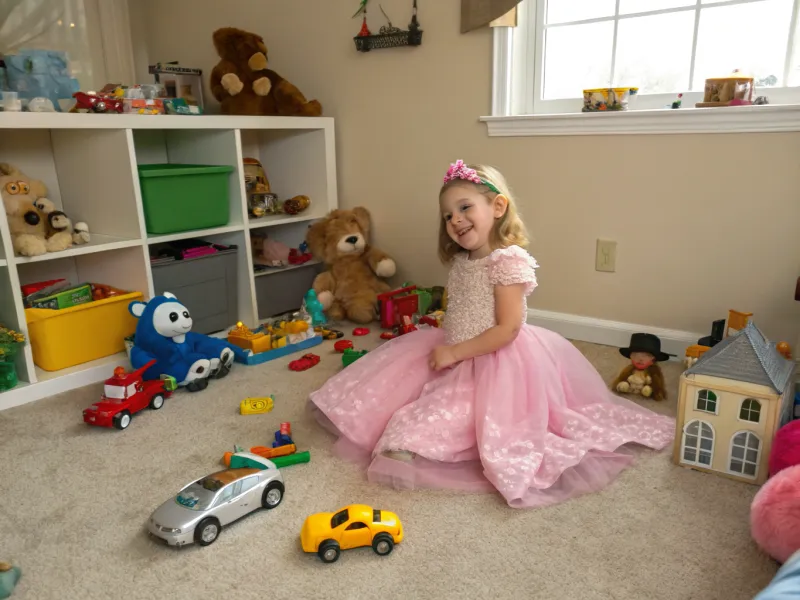22 Types of Losers Parents Unknowingly Create
Let’s face it, parenting is a wild ride, full of trial and error, and sometimes we unknowingly nurture habits that don’t exactly scream ‘future success.’
But hey, no parent is perfect, right? So why not have a laugh, and maybe a light bulb moment, about the different kinds of ‘losers’ we might be nurturing right under our noses?
Ready to explore these 22 types that might just make you scratch your head and think, ‘Is that my kid?’
1. The Perpetual Procrastinator

We’ve all been there—putting off tasks until tomorrow, but the Perpetual Procrastinator takes it to a new level. This is the kid who has a PhD in delaying everything, from chores to homework. You hand over a simple task, and they magically transform it into an epic saga that drags on for weeks. Why do today what you could put off until the absolute last second, right?
Their room? A chaotic shrine to the art of postponement, littered with half-baked science projects and forgotten laundry. They have a unique relationship with deadlines; they treat them more like guidelines. To them, time is a stretchy concept, bent to fit the urgency of the task at hand—or lack thereof.
But here’s the kicker: they often excel when they finally get around to doing the work. It’s almost like they thrive on the adrenaline rush of last-minute pressure. While this might work now, it’s a risky game for the long haul. Encouraging them to break tasks into manageable chunks could be a game-changer. Who knows, maybe they’ll turn over a new leaf and actually finish something ahead of schedule!
2. The Social Media Zombie

Meet the Social Media Zombie, a kid whose life revolves around likes, shares, and endless scrolling. They’re so absorbed in their virtual world that you wonder if they even notice the real one. Mealtime conversations? Forget it. They’re too busy curating the perfect online persona to engage with mundane family chatter.
Their thumbs dance across the screen with the finesse of a seasoned concert pianist, crafting snappy captions and filtering photos to perfection. But there’s a downside—this constant digital consumption often leaves them feeling anxious and disconnected from reality. It’s a double-edged sword, providing a sense of community yet alienating them from face-to-face interactions.
To help them unplug, suggest setting designated screen-free times or introducing activities that require real-world engagement. Encourage them to look up from their screens and see the world without a digital filter. After all, the likes and followers will be there when they get back.
3. The Helicopter Child

Enter the Helicopter Child, a product of overzealous parenting where every action is monitored, and every decision is pre-decided. This child rarely gets the chance to make mistakes, as their parents are constantly hovering, ready to swoop in at the first sign of trouble. The result? A kid who struggles with independence and decision-making.
They’ve become accustomed to someone else pulling the strings, leaving them unsure of how to navigate the world on their own. Simple tasks become monumental challenges because they’ve never faced them solo. It’s like they’re living life on autopilot, with someone else in the driver’s seat.
To help them gain some autonomy, parents can gradually step back, allowing them to make age-appropriate choices. Encourage problem-solving and celebrate small victories when they accomplish something independently. In time, they might just surprise you with their newfound confidence.
4. The Entitled Emperor

Ah, the Entitled Emperor—the child who believes the world revolves around them and their every whim. This mindset often comes from being showered with everything they desire without earning it. They’ve never met a ‘no’ they couldn’t turn into a ‘yes’ with a bit of whining or negotiation.
Raised in a kingdom of instant gratification, they’re not exactly familiar with the concept of patience or hard work. Everything is handed to them on a silver platter, fostering a sense of superiority and expectation that life will always cater to their demands.
Breaking this cycle requires setting boundaries and teaching the value of effort and perseverance. Encourage them to work for what they want, whether it’s through chores or other responsibilities. With a little guidance, they might just learn that the best things in life are worth working for.
5. The Complaint Connoisseur

Meet the Complaint Connoisseur, a child who has mastered the art of finding fault in everything and anything. From the weather to dinner choices, nothing is beyond critique. It’s as if they’re conducting an ongoing audit of life, and nothing quite meets their standards.
This behavior often stems from a household where negativity is the norm. When complaints are more frequent than compliments, children learn to focus on what’s wrong rather than what’s right. It’s a tough habit to break, but turning the tide towards positivity is possible.
Encourage them to practice gratitude by identifying things they’re thankful for each day. Introducing them to activities that require teamwork and problem-solving can help shift their perspective towards constructive criticism rather than constant complaining. Who knows, they might just discover the joys of appreciation.
6. The Over-Scheduled Overachiever

The Over-Scheduled Overachiever is a kid running on the hamster wheel of endless activities, fueled by the pressure to excel at everything they touch. From violin lessons to soccer practice and academic clubs, their schedule is packed tighter than a sardine can.
While ambition is great, the constant hustle can lead to burnout and a lack of genuine enthusiasm. They may appear like they’re thriving, but underneath, they might be drowning in stress and exhaustion. It’s a high-wire act with little room for rest or self-reflection.
To help them find balance, it’s essential to prioritize downtime and encourage them to pursue activities they genuinely enjoy. Teaching them that it’s okay to say ‘no’ and to savor moments of stillness could make all the difference. After all, life is a marathon, not a sprint.
7. The Fearful Follower

The Fearful Follower is the kid who always walks a step behind, afraid to stray from the crowd. They’re the shadows in the background, blending in rather than standing out. This behavior often results from a lack of self-confidence and the need for acceptance.
Fearful Followers rarely make their own choices, worried about what others might think. They become adept at reading the room and molding themselves to fit in, sometimes losing sight of who they really are. It’s a survival tactic that keeps them in their comfort zone but hinders personal growth.
Building their confidence through activities that highlight their unique talents can be transformative. Encourage them to voice their opinions and celebrate their individuality. Who knows, they might just discover the strength to lead instead of follow.
8. The Couch Potato Prodigy

Behold the Couch Potato Prodigy, a child who has perfected the art of doing nothing. They’ve embraced the sedentary lifestyle with open arms, finding solace in the glow of a TV screen or the allure of video games. Physical activity? Not their cup of tea.
This behavior often stems from a comfort with routine and a fear of venturing into the unknown. Exercise and outdoor activities seem like foreign concepts, overshadowed by the safety of their couch kingdom. It’s a cycle of inactivity that can lead to health issues down the road.
Encouraging small steps towards movement, like a family walk or a fun sports activity, can break the inertia. Highlighting the fun side of staying active and setting achievable goals may just ignite the spark of enthusiasm they need. After all, life is more exciting beyond the couch.
9. The Critic Extraordinaire

Enter the Critic Extraordinaire, a kid who sees the world through a lens of skepticism and judgment. They’re quick to point out flaws and rarely impressed, constantly evaluating everything with a critical eye. It’s like they have an inner Simon Cowell, ready to deliver biting commentary at a moment’s notice.
This mindset often evolves in environments where criticism outweighs encouragement. They learn to scrutinize themselves and others, sometimes mistaking cynicism for intelligence. While a healthy dose of skepticism is useful, too much can stifle creativity and relationships.
Fostering a more balanced view of the world can help them appreciate beauty and positivity. Encourage them to celebrate achievements and recognize effort, not just outcomes. With time, they might discover that there’s more joy in creating than critiquing.
10. The Pampered Prince/Princess

Meet the Pampered Prince or Princess, a child wrapped in luxury and indulgence. From designer clothes to the latest gadgets, they have it all, often without lifting a finger. Their every need is catered to, leaving little room for understanding effort or value.
This lifestyle creates a bubble where reality is skewed, and expectations are high. They grow up believing that life is a series of handouts rather than achievements. The challenge lies in teaching them the worth of hard work and patience in a world that’s always given them what they want.
Introducing responsibilities and setting realistic expectations can help burst this bubble. Encourage them to earn privileges and rewards, fostering a sense of accomplishment. It’s a journey from entitlement to empowerment, and with guidance, they might just find satisfaction in the process.
11. The Excuse Engineer

Say hello to the Excuse Engineer, a master at crafting reasons for why tasks aren’t completed or obligations aren’t met. They’ve honed the skill of sidestepping responsibility into an art form, always ready with a new excuse for every oversight.
This habitual excuse-making often stems from a fear of failure or disappointing others. Instead of confronting challenges, they build elaborate stories to cover up shortcomings, avoiding accountability at all costs. It’s a temporary fix that prevents growth and learning.
Encouraging honesty and accountability can help break this cycle. Teaching them to own their actions and learn from mistakes fosters resilience and maturity. With a little practice, they might just find that facing challenges head-on is more rewarding than running away.
12. The Overprotected Innocent

The Overprotected Innocent is the child wrapped in cotton wool, shielded from every potential harm by anxious parents. While well-intentioned, this overprotection hinders their ability to take risks and learn from mistakes, leaving them ill-equipped for the real world.
These children often lack the resilience and problem-solving skills developed through facing challenges. They’re accustomed to a safety net always being there, which can breed a fear of the unknown and an aversion to change.
Gradually introducing them to calculated risks and new experiences can build their confidence. Encouraging small steps towards independence helps them understand that mistakes are part of life. In time, they might just become the bold adventurer they were meant to be.
13. The Academic Automaton

The Academic Automaton is the kid who views learning as a checklist rather than a journey. They dutifully memorize facts and churn out assignments, but the spark of curiosity is missing. It’s like they’re on autopilot, going through the educational motions without real engagement.
This mindset often arises from a focus on grades over genuine understanding. They’re conditioned to see education as a means to an end, missing out on the wonder and excitement of discovering new ideas and concepts.
Inspiring a love for learning requires shifting focus from grades to exploration and critical thinking. Encourage them to pursue topics that ignite their passion and foster a curiosity-driven mindset. Who knows, they might rediscover the joy of learning and become lifelong enthusiasts.
14. The Competitive Comrade

Meet the Competitive Comrade, a child who views life as a constant competition. Everything from board games to academic achievements becomes a battle to be won, often at the expense of camaraderie and enjoyment.
This behavior is usually nurtured in environments where winning is prioritized over participation. They learn to measure success by comparison, sometimes overshadowing personal growth and relationships.
Encouraging a shift towards collaboration and celebrating personal achievements can redefine their approach. Teaching them the value of teamwork and the joy of shared victories helps them appreciate the journey as much as the outcome. With this perspective, they might just find that winning isn’t everything.
15. The Tech-Savvy Recluse

The Tech-Savvy Recluse is the kid who thrives in the digital realm, often at the expense of real-world interactions. They’re the ones lost in coding, gaming, or digital creation, with the physical world playing second fiddle to their virtual adventures.
This immersion into technology can lead to isolation, creating a barrier to social skills development and face-to-face communication. While their technical prowess is commendable, the lack of balance can hinder personal growth.
Balancing screen time with real-world experiences helps them develop well-rounded skills. With the right support, they can harness their tech talents while staying connected to the world around them.
16. The Overly Cautious Observer

The Overly Cautious Observer is the child who watches from the sidelines, hesitant to join in. They’re the ones who prefer to observe rather than participate, often missing out on experiences that foster growth and learning.
This cautiousness usually stems from a fear of failure or judgment. They become adept at assessing situations from afar, avoiding risks that might lead to embarrassment or disappointment.
Building their confidence through gentle encouragement and support can help them take the leap. Creating a safe space for exploration and experimentation fosters resilience and courage. With time, they might just find the joy in jumping headfirst into new adventures.
17. The Instant Gratification Guru

Enter the Instant Gratification Guru, a child who craves immediate rewards and struggles with patience. They’re the ones who can’t wait for the cake to bake or the toy to be assembled, demanding things here and now.
This behavior is often a result of a fast-paced world where waiting seems unnecessary. They’re accustomed to getting what they want with minimal delay, making it challenging to understand the value of patience and long-term rewards.
Teaching them the beauty of delayed gratification through activities that require time and effort can be eye-opening. Encourage them to engage in hobbies that unfold over time, helping them appreciate the process. With practice, they might just find that good things come to those who wait.
18. The Moody Maverick

Meet the Moody Maverick, a child who rides the emotional rollercoaster like a seasoned pro. One moment they’re on top of the world, and the next, they’re buried in a cloud of melancholy. These dramatic mood swings can leave everyone around them walking on eggshells.
This emotional turbulence often stems from a struggle to express feelings in a healthy way. They’re learning to navigate the complexities of their emotions, sometimes feeling overwhelmed by the intensity of it all.
Helping them find constructive outlets for their emotions, such as art or physical activity, can be transformative. Encourage open communication and provide a supportive environment for self-expression. With time, they might just find a balance and navigate their emotions with grace.
19. The Defiant Rebel

The Defiant Rebel is the kid who thrives on challenging authority and breaking the rules. They’re the ones who push boundaries and question everything, often for the sake of rebellion rather than reason.
This defiance is usually a quest for identity and independence. They seek to carve their own path, sometimes clashing with authority figures in the process.
Channeling this rebellious energy into positive pursuits can be a game-changer. Encouraging them to explore creative outlets or leadership roles provides a sense of purpose and direction.
20. The Over-Optimistic Daydreamer

The Over-Optimistic Daydreamer is a child nurtured with endless encouragement, basking in the realm of imagination. Bursting with creativity, they often drift into daydreams, conjuring worlds where anything is possible.
While this fuels a vibrant imagination, they sometimes struggle with grounding their aspirations in reality. In school, their minds wander, sketching epic tales instead of solving equations. Social interactions are peppered with grand ideas and fanciful stories, leaving peers both intrigued and bemused.
Guiding them involves balancing encouragement with gentle nudges towards practical steps, ensuring dreams can morph into achievable goals.
21. The Drama Diplomat

Ah, the Drama Diplomat—part negotiator, part performer, and full-time exaggerator. This kid turns every small disagreement into a Shakespearean tragedy. A sibling taking the last cookie? Betrayal of the highest order. A gentle ‘no’ from a parent? Grounds for a full emotional press conference.
They’ve learned that dramatics often lead to attention, sympathy, or getting their way. It’s not always malicious—it’s just their way of navigating emotional situations. But left unchecked, this flair for drama can evolve into manipulation or a struggle with emotional regulation later in life.
The antidote? Help them separate real emotions from performance. Teach them that it’s okay to feel deeply—but it’s also important to respond, not just react. With a little coaching, they can channel that expressive energy into empathy, not theatrics.
22. The Praise Addict

The Praise Addict is the child who lives for validation. Whether it’s drawing a half-circle or putting their shoes on (the wrong feet), they need a round of applause. Encouragement is essential, but this kid’s self-worth hinges on constant external approval.
Why does this happen? Often, it starts with good intentions—lavishing praise on every effort to build confidence. But somewhere along the way, the message shifts from “you did great” to “you are only great when praised.”
To recalibrate, introduce the concept of intrinsic motivation. Encourage effort, not just results. Replace “You’re so smart” with “You worked really hard on that.” The goal? Helping them see their value comes from within—not just the claps and gold stars.







